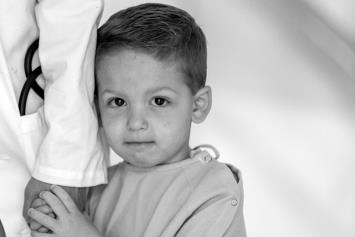Helicobacter Pylori (H. Pylori)
H. pylori is a common stomach bacteria. It can cause pain, sores (ulcers), and redness in the stomach.
What Is H. Pylori?
Helicobacter pylori (H. pylori) is a common type of bacteria (germ). It can cause redness and soreness of the lining of the stomach (gastritis), as well as a sore (ulcer) in the stomach or small intestine. Once someone is infected, the bacteria may live in their stomach for years. Helicobacter infections are very common and can happen to anyone.
Causes
- How the disease is spread is unknown. It most likely spreads to people form surfaces that meet with spit (saliva), like: dirty food, water, eating tools, and drinkware.
- To avoid spreading germs:
- Wash your hands before eating or drinking.
- Eat food that has been properly cooked and do not share eating utensils.
- Drink from a safe place and do not share drinking containers.
What are H. Pylori Symptoms?
Some people that get infected may not have any symptoms. The most common symptom of a Helicobacter infection is heartburn. That’s when you have a burning pain in the upper part of the stomach, under your rib cage. It’s usually worse when the stomach is empty but can happen at any time. Other symptoms may include:
- Nausea
- Vomiting
- Loss of appetite
How Is H. Pylori Diagnosed?
The doctor or health care provider will ask about your child’s health history and symptoms. They will also do a physical exam and may order:
- Upper endoscopy – This procedure is used to see inside the esophagus, stomach, and duodenum (Picture 1). A small, bendy (flexible) tube called an endoscope is used to look for redness, swelling, bleeding, ulcers, or infections.
- Other tests if needed.
How Is H. Pylori Treated?
Helicobacter pylori is treated with:
- Antibiotics – Antibiotic medicines are prescribed to treat the bacteria. Your child must finish all prescribed medicine to get rid of the infection. Treatment usually lasts 10 to 14 days.
- Other medicine that stops the stomach from making acid.
When to Call the Doctor
Call your child's doctor or health care provider if:
- Their symptoms come back or never go away completely, even after treatment.
- Any other family member has stomach pain or vomiting.
Helping Hands™ Patient Education Materials
Helping Hands™ are easy-to-read guides about different illnesses, therapies, surgeries, and more. They’re created by the Patient Education team at Nationwide Children’s Hospital and are reviewed and approved by clinical staff, like nurses, doctors, pharmacists, and psychologists. Nationwide Children's Hospital is not responsible for misuse of information in patient education materials, including Helping Hands.
HH-I-173 | ©1993, revised 2024, Nationwide Children’s Hospital


